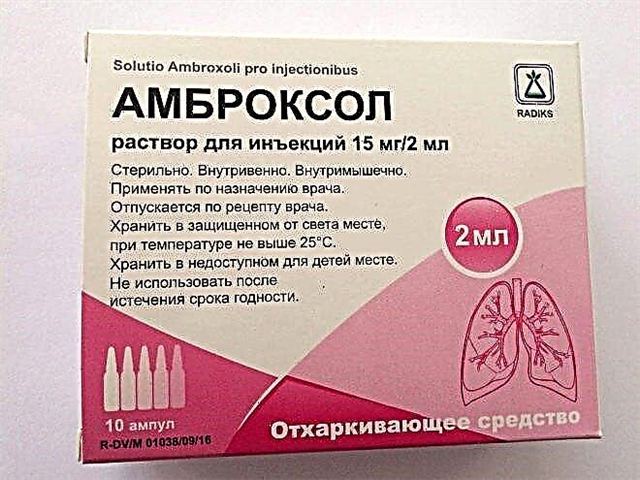
When the expectant mother develops a strong cough with the formation of a small amount of secretion or hard-to-cough up thick sputum, medications have to be used, because due to cough shocks, the tone of the uterus may increase, which poses a threat to the fetus. That is why in case of respiratory diseases in pregnant women, doctors try to eliminate the cough as quickly as possible. One of the drugs to combat such a dangerous symptom is Ambroxol.
However, according to the instructions for use and review of reviews, its use during pregnancy in the 1st, 2nd or 3rd trimester has certain limitations.

Features of the drug
Ambroxol is available in four dosage forms.
- One of the most popular is solution, which can be taken orally or used for inhalation. This drug is sold without a prescription in 40 ml and 100 ml bottles. The solution itself is a brown or colorless liquid. Its main ingredient is ambroxol hydrochloride at a dosage of 7.5 mg per ml.

- No less popular form of "Ambroxol" are pills... They have a round shape and white color, and the content of the active substance in one tablet is 30 mg. This version of the drug is sold without a prescription in packs containing from 10 to 100 pieces. The average price of 20 tablets is 40-50 rubles.

- In addition to tablets and solution for internal use, there is also "Ambroxol" in syrup and in injections... Sweet medicine is commonly used to treat children. Available in banana, fruity, raspberry or apricot flavors, it comes in 50-150 ml bottles and contains 15 or 30 mg of ambroxol per 5 ml scoop.

- Injection solution is a sterile liquid packaged in 2 ml ampoules containing 7.5 mg of active ingredient in 1 ml. It is used intravenously or for intramuscular injection. Both forms are over-the-counter, but consultation with a doctor before purchasing is advisable.

Operating principle
"Ambroxol" has the ability to influence the synthesis of secretions in the bronchi, so this medicine is mucolytic... Once in the body, the active substance of the medication is transferred to the bronchial tree, where it activates the formation of glycoproteins and acts on sputum polysaccharides, changing their structure. This loosens the mucus and makes it easier to cough up.
Yet "Ambroxol" stimulates the motor activity of the respiratory tract and affects the activity of the ciliated epithelium. Such properties provide the expectorant effect of the drug. In addition, the medication acts on the alveoli, stimulating the production of surfactant and preventing its breakdown.

Is it allowed during pregnancy?
The use of "Ambroxol" is prohibited in the early stages, which can be found in the annotation to the drug. In the first months of gestation, the embryo is most vulnerable, therefore, the use of such a drug, like many other drugs, must be abandoned. If the expectant mother second or third trimester, the decision on taking "Ambroxol" should be made by her attending physician. In the event that the specialist decides that the treatment will be beneficial, the use of the drug will be justified.
"Ambroxol" is prescribed for diseases of the respiratory tract, if they are manifested by a cough with a very viscous secretion. The drug can be prescribed to pregnant women with the following diseases:
- acute bronchitis;
- chronic respiratory disease;
- bronchial asthma;
- pneumonia;
- bronchiectasis;
- cystic fibrosis.

Contraindications and side effects
"Ambroxol" is not used in women with hypersensitivity to any ingredient of the selected drug option. It also should not be used for peptic ulcer disease, severe liver pathologies, kidney damage and some other diseases, therefore, such a medicine must be prescribed by a doctor. The syrup is also not used for disorders of carbohydrate metabolism.
During treatment with Ambroxol, various negative effects of the medication may appear, including:
- nausea;
- heartburn;
- loose stools;
- allergic rash;
- weakness;
- dry mouth;
- headaches.
If alarming symptoms occur, you should consult with your doctor, who must decide whether to use the drug further or replace it with an analogue.

Instructions for use
A single dosage of "Ambroxol" is determined individually, because it depends on the prescribed form, and on the condition of the pregnant woman, and on some other factors. A syrup, tablet or solution is drunk after meals to reduce the risk of negative effects on the gastrointestinal tract. The frequency of admission is usually 2 or 3 times a day, and the duration of the use of "Ambroxol" should be found out from your doctor.
For inhalation, the solution is combined with saline in the proportion prescribed by the doctor, and then placed in a nebulizer. For one procedure, 2-3 ml of solution is usually used, and the drug should be breathed once a day (less often - twice a day).

Reviews
Women who had a chance to use "Ambroxol" during pregnancy, speak about it mostly positively. The medicine is called effective for both dry cough and wet cough with a small amount of viscous sputum.... The tolerability of the drug is assessed as good, noting side effects in very rare cases.

Analogs
A complete replacement for "Ambroxol" can be called drugs with the same active substance, for example, "Lazolvan", "Ambrobene", "Flavamed" or "Ambrosan". All of them are contraindicated in the first trimester, but can be prescribed in the second half of pregnancy if the doctor sees such a need. Since they are represented by syrups, solutions and tablets, it is very easy to find a suitable analogue.

If the expectant mother has a hypersensitivity to the active ingredient "Ambroxol", the specialist will select a cough remedy with a different composition, for example, prescribe "Mukaltin", "Doctor Theiss", "Bromhexin" or "Stodal".
It is important to note that many of the expectorant drugs and mucolytics are not used during pregnancy, since their effect on the fetus is poorly understood, and herbal components often provoke allergies. And therefore, it is unacceptable to replace "Ambroxol" with an analogue on your own.




